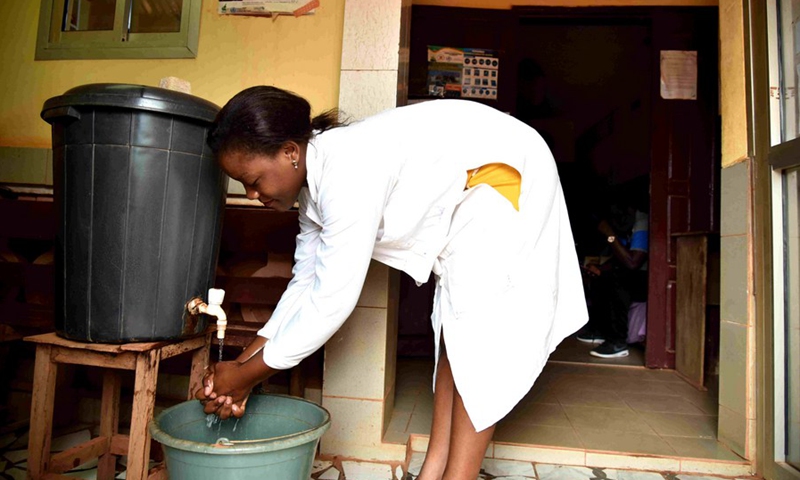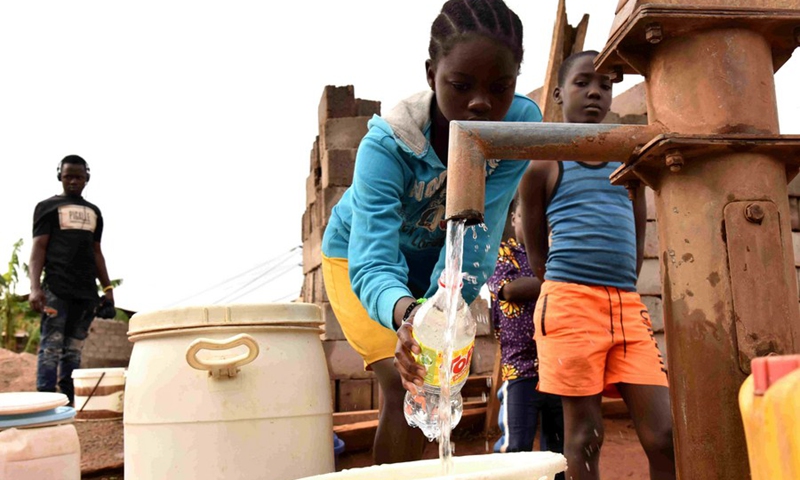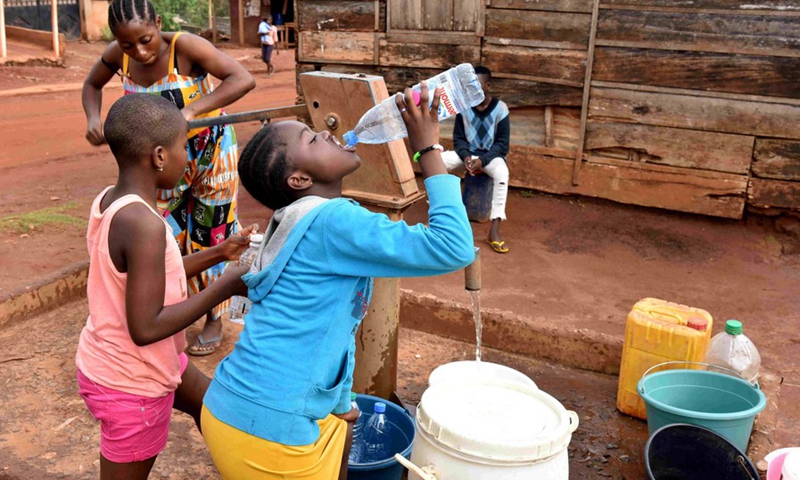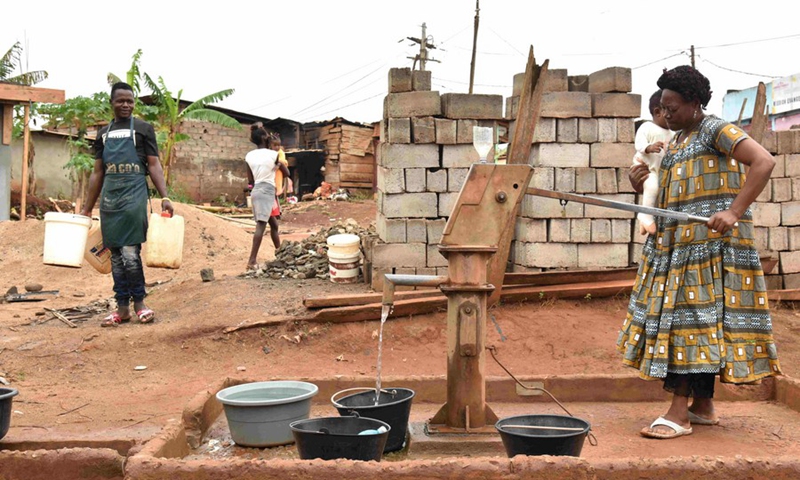
A nurse washing her hands at the entrance to her dispensary with water from a borehole in Ekie-South, a peri-urban neighborhood in Cameroon's capital city Yaounde, March 19, 2021.(Photo: Xinhua)

People fetching water from a borehole in Ekie-South, a peri-urban neighborhood in Cameroon's capital city Yaounde, March 19, 2021.(Photo: Xinhua)

People fetching water from a borehole in Ekie-South, a peri-urban neighborhood in Cameroon's capital city Yaounde, March 19, 2021.(Photo: Xinhua)

Ebogo Barbara, 57, a mother of five, was babysitting her young granddaughter as she fetched water from a borehole in Ekie-South, a peri-urban neighborhood in Cameroon's capital city Yaounde, March 19, 2021. (Photo: Xinhua)
In the shade of an imposing pear tree, over a dozen women and children gathered on a dusty road to fill buckets with water from a borehole in Ekie-South, a peri-urban neighborhood in Cameroon's capital city Yaounde.
Seventeen years ago, a group of Chinese engineers in collaboration with the Cameroon government came to the neighborhood and created a narrow, deep hole in the ground that started generating water, traditional leader of the community Alain Charles Mbida told Xinhua.
He said the borehole came as a big relief for the population that has been suffering from water shortage for decades, but it was not until the advent of COVID-19 last year that the residents understood how important water is to a healthy lifestyle.
Acutely aware of the dangers of the highly contagious virus that has infected over 42,000 people and killed more than 630 in Cameroon, residents of Ekie-South began taking pains to maintain good hygiene.
"Now we're using more water than we used to be. This borehole helps us a lot," Mbida said.
"We have been able to remain hygienic and in good health during COVID-19 thanks to this borehole," local resident Bengono Nkama Giovanni told Xinhua.
"I trekked for over one kilometer to fetch water here. The water is potable. We no longer buy water," said Agnes Ondoa, 42, mother of four.
"People come from everywhere to fetch water here," 57-year-old Ebogo Barbara told Xinhua. A mother of five, Barbara was babysitting her young granddaughter as she filled a bucket with water.
"We ensure that the surroundings of the borehole are neat, we avoid dirty buckets from coming here...we ask everyone to wash the buckets and wash hands before fetching the water," said Barbara.
Not a single person in Ekie-South has been infected by COVID-19 since the first case was detected in Cameroon in March 2020, she added.
But not every neighborhood in the Central African nation has been that lucky.
Dealing with the largest public health crisis in contemporary times, Cameroonian health authorities battling to stem a jump in novel coronavirus infections have made the phrase "Wash Your Hands" their mantra.
"But how and where?" said 25-year-old Jones Micheal, a resident of Damas neighborhood of Yaounde where the water crisis is rampant.
In most of Cameroon's urban areas, water has become a scarce resource in poor settlements. Yaounde, with a population of over three million, suffers a water supply-demand gap of 250,000 cubic meters daily, according to a study in 2018.
Without access to tap water, residents rely on wells, which usually dry up during the dry season. Others rely on rainfall. However, rainy seasons are shorter than they were 30 years ago, according to weather experts.
So dire is the situation that many people are now drinking water from unsafe sources.
Faced with water challenges, the COVID-19 pandemic has spurred the government to dispatch water tankers, drill boreholes, and repair taps in most localities.
The government has also equipped schools and hospitals with buckets that are regularly filled with water in a bid to allow school children and hospital staff, patients, and visitors to wash their hands at all times.
But as authorities scramble to boost immediate water supplies, experts and residents of thirsty slums and villages say the solutions must last long after the pandemic has passed.
"These (solutions) should be sustainable and cost-effective. As COVID-19 cases continue to surge, it is more critical than ever before to ensure that every Cameroonian has access to safe water and sanitation now and forever," Jude Jumbam, a researcher with a non-profit local water management NGO told Xinhua by phone.
"We need to use COVID-19 pandemic to look for both short-term and long-term water solutions," he added.
The World Water Day is an annual United Nations observance day held on March 22 annually. It highlights the importance of fresh water and advocates for the sustainable management of freshwater resources.
